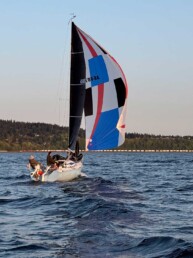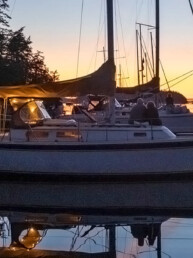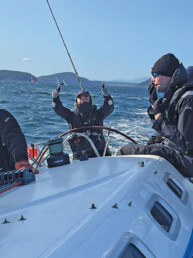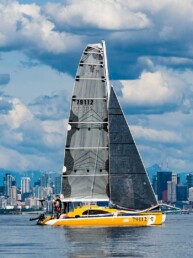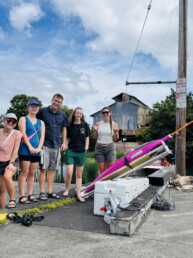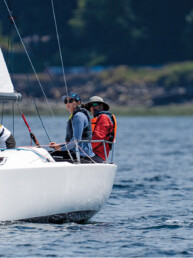Sailing across the ocean has always been on “the list,” but for some reason, I wasn’t sure it would actually happen.
It just seemed like such a far-fetched and crazy idea — and how many people really do something like that? Well, it happened, and it was an awesome time with an amazing group of people. I can happily say we are all better friends than when we started, which is not something to be taken lightly.
Our noble steed for the 2022 Pacific Cup was the Seattle-based Aerodyne 43, Freja. She’s a modern racer-cruiser designed by Rodger Martin with a hull shape and sail plan based on the older sister Aerodyne 38. She has a non-overlapping sail plan, deep bulb keel, large asymmetrical spinnakers and an impressive interior. We lovingly refer to her as a Cadillac — big and comfy with extravagant features, not trying to kill you, but when you put your foot into it she lets loose and takes off.
The race started with an overcast San Francisco sky and wind in the upper 20s heading out from the Golden Gate Bridge. We donned our foulies and warm gear for what we hoped would only be a few days. We started the day with a reef and #3 jib. I was feeling the anticipation of the start but quickly forgot about the monstrosity of the trip to Hawaii ahead and got to work on the bow, plugging in the headsail.
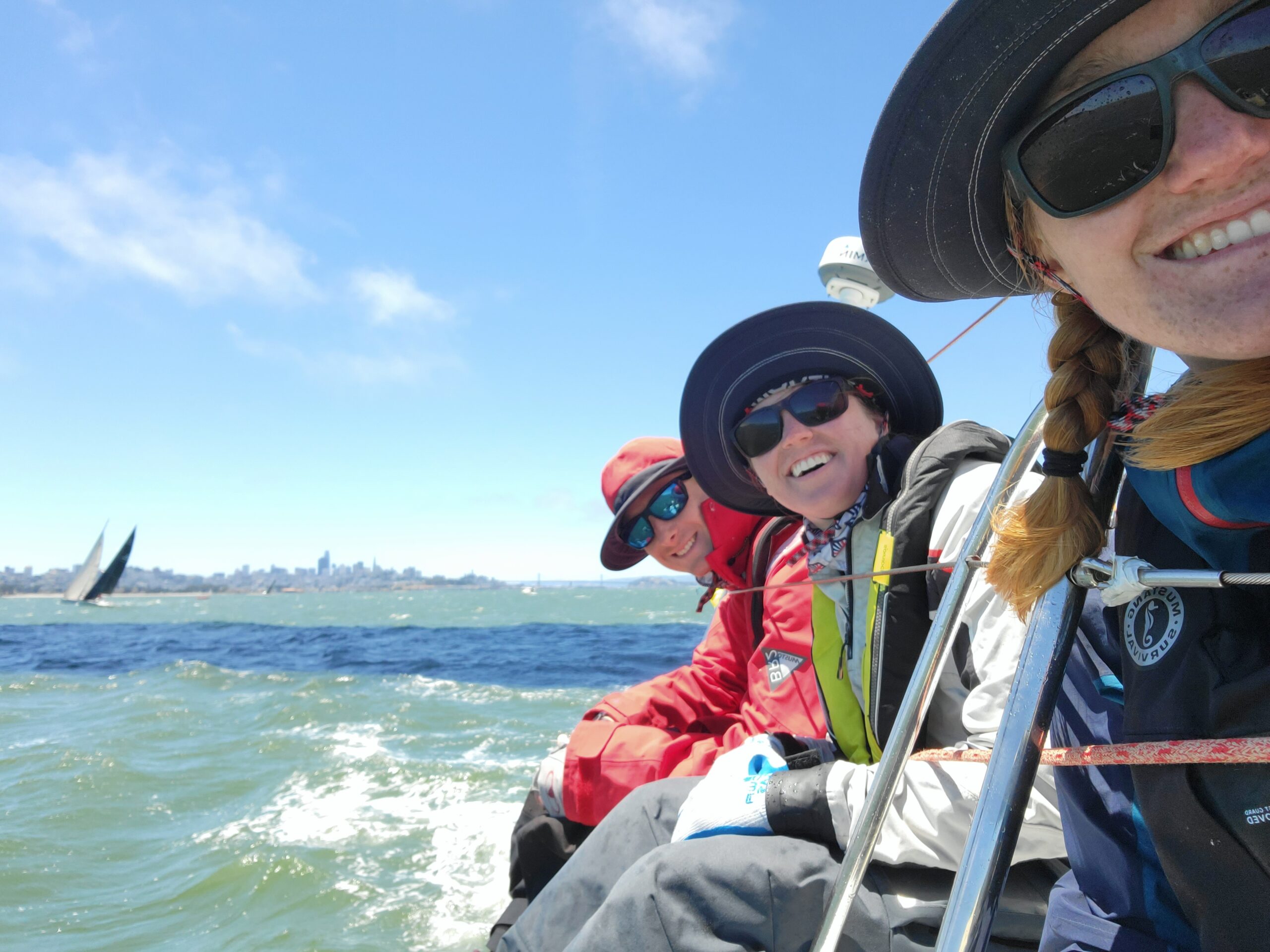 It was a bit of a wet ride initially but once we were under the bridge and on our way to the Farallon Islands, the sea state settled down significantly. We shook the reef out and quickly fell into watches about three hours after the start. We knew the best way to push ourselves the hardest was to get adequate rest. And with eight crew onboard, we could continually push the boat hard, harder than other teams with less crew.
It was a bit of a wet ride initially but once we were under the bridge and on our way to the Farallon Islands, the sea state settled down significantly. We shook the reef out and quickly fell into watches about three hours after the start. We knew the best way to push ourselves the hardest was to get adequate rest. And with eight crew onboard, we could continually push the boat hard, harder than other teams with less crew.
This year the Pacific High was quite unstable, which made it difficult to plan how long we would be jib-reaching. It turned out that three and a half days was how long it took us to set a spinnaker, about two days longer than “normal.” The following days meshed together. The water turned to a deep royal blue and we were no longer wearing waterproof socks or heavy jackets at night.
Our watch schedule shifted to four hours on, four hours off at night and six hours on, six hours off from 6 a.m. to 6 p.m. The watches rotated every day so the night watches were always changing. We found this was a good way to break up the monotony that comes with crossing an ocean, and we had a rotating schedule of chores each day as well. Lunch prep usually consisted of digging into the fridge for lunch meat and getting out the next day’s dinner so it could thaw in time. Happy hour took place at 6 p.m. with the watch change. Usually a round of off-color or dad jokes were told, followed by a fresh bag of gummy worms or peanut M&Ms, and just a sniff of Ron Zacapa rum was enough to set us straight to bed.
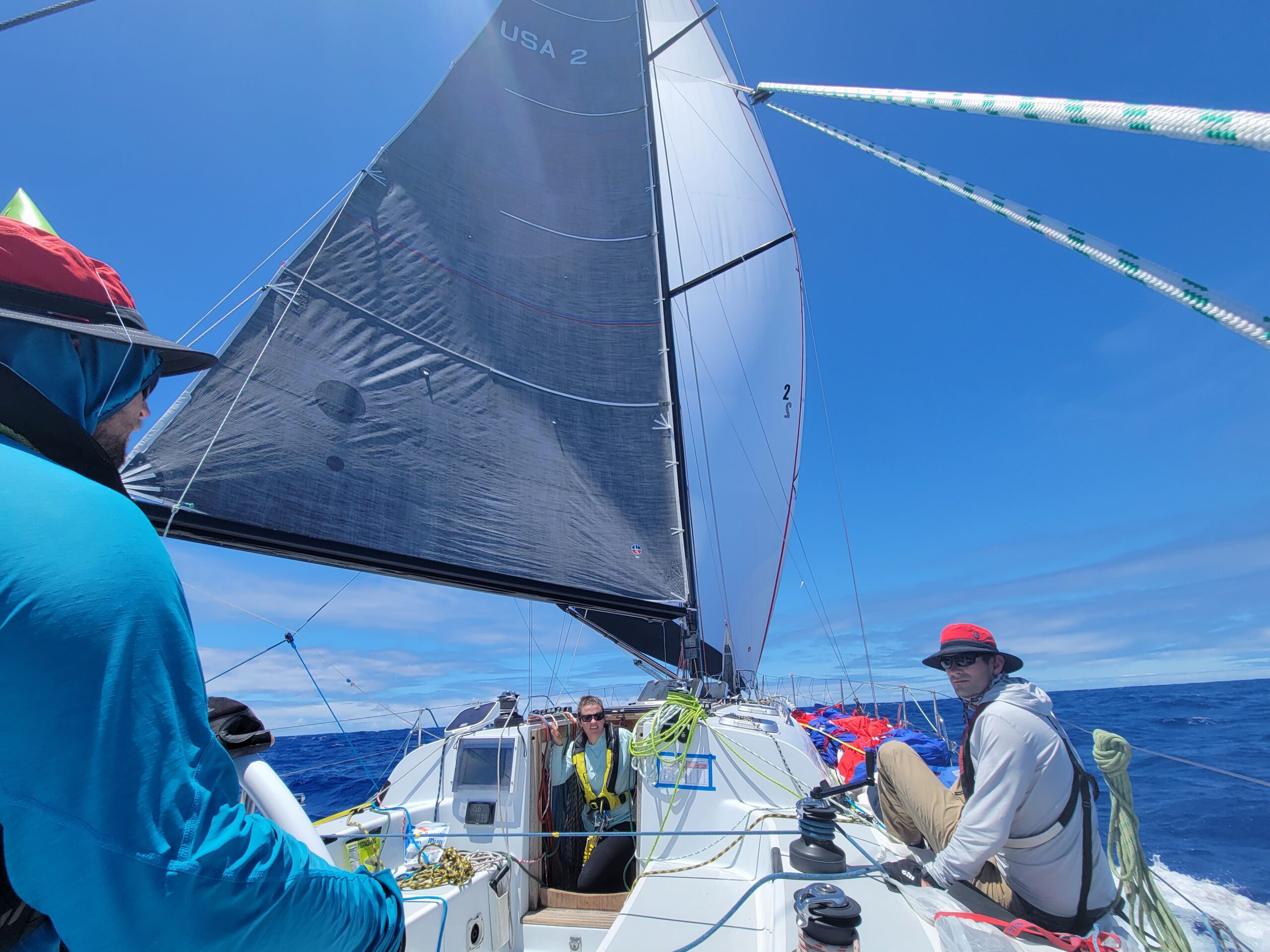 By day six we were fully locked into 12 to 18 knots of breeze. Freja was powered up and surfing beautifully. Off-watch conditions improved significantly once we were able to “turn the corner.” The boat flattened out and sleeping became easier — dare I say, almost pleasant. Night watches were delightful, with a mostly full moon rising around 1 a.m. and the sea state improving. According to Nav, our night shifts were making dramatic gains of 20 to 30 miles or so on the competition. We were now also consistently picking off 200-plus mile days.
By day six we were fully locked into 12 to 18 knots of breeze. Freja was powered up and surfing beautifully. Off-watch conditions improved significantly once we were able to “turn the corner.” The boat flattened out and sleeping became easier — dare I say, almost pleasant. Night watches were delightful, with a mostly full moon rising around 1 a.m. and the sea state improving. According to Nav, our night shifts were making dramatic gains of 20 to 30 miles or so on the competition. We were now also consistently picking off 200-plus mile days.
On day seven we finally got into the trade wind sailing that we were promised so many times. Winds were consistent, the sun was hot with few cloud breaks, and we were chasing squalls to get the best wind. Below decks was hot and stagnant. We turned the oven on only at night and pre-cooked dinner so we didn’t have the oven on during the hottest parts of the day.
At this point, the night watches were getting pretty delirious. Here is a watch mate’s update that was sent out to our shore support and family back home:
Good morning from the 2 a.m. – 6 a.m. watch crew on Freja (Taylor/Molly/Jonah/Jake),
just coming down below after 4 hours of happiness doing a hot spinnaker reach in
12-18 knots. I (Jonah) started it off right by getting up early so I could have another bowl of the outstanding mac & cheese and pulled pork leftover from dinner. It only got better from there, sailing under a powered up and moonlit kite and surfing the waves whenever possible.
Important discussion topics during the watch included “exactly what kind of a chalk/dirt mixture do these caffeinated espresso hammer gels taste like?” and “what’s your favorite method for getting your pants back up in the head without falling over when the boat is heeled?” and my personal favorite, “how to communicate effectively with your significant other while still never admitting when you’re wrong.”
The conversation flows simultaneously in parallel with the interjections made by sailors at work: wind shifting left, now at 006, OK to come down … helm is light, I’ll take a little more main. The darkness to windward looks darker than the darkness elsewhere, expect more wind soon … heading currently 220 … working up, prepare for some more spice … 13.6 knot boat speed! NOICE!
Looking forward now to 6 hours off, better known amongst the crew as “the big sleeps.”
-Jonah
By day nine, the end was in sight. We were all getting stir-crazy and what we affectionately referred to as “the grumps” started to set in. We could smell the finish line. We tried to keep pushing hard, but that proved difficult with such little sleep, too much sun and only 43 feet of living space for eight people. Driving the boat was also getting pretty taxing. The sea state was large, with remnants of Hurricane Darby contributing to large side waves that hurled us down them. We could get about two great surfs, followed by what we developed as the “flop and surf.” This is a technique in which you would get thrown off your course by a giant side wave, the boat would heel over, the kite would kiss the water and then you would go careening down the front side of the wave. It was not the safest technique, but often necessary and sometimes effective. We referred to this as a non-consensual surf, usually resulting in top speeds, wide eyes, white knuckles, and a wide stance behind the wheel.
As you’d expect, reaching the finish in Hawaii was a mix of emotions. I hope everyone that wants to gets to cross an ocean, or half of one, on a sailboat. The “Great Blue” has amazing qualities that are hard to explain in words. You really have to experience it firsthand. It takes you away from reality and brings you back, all at the same time. The ocean also makes you realize that the place we live in is pretty wonderful. Let’s try to keep it that way and not take it for granted.
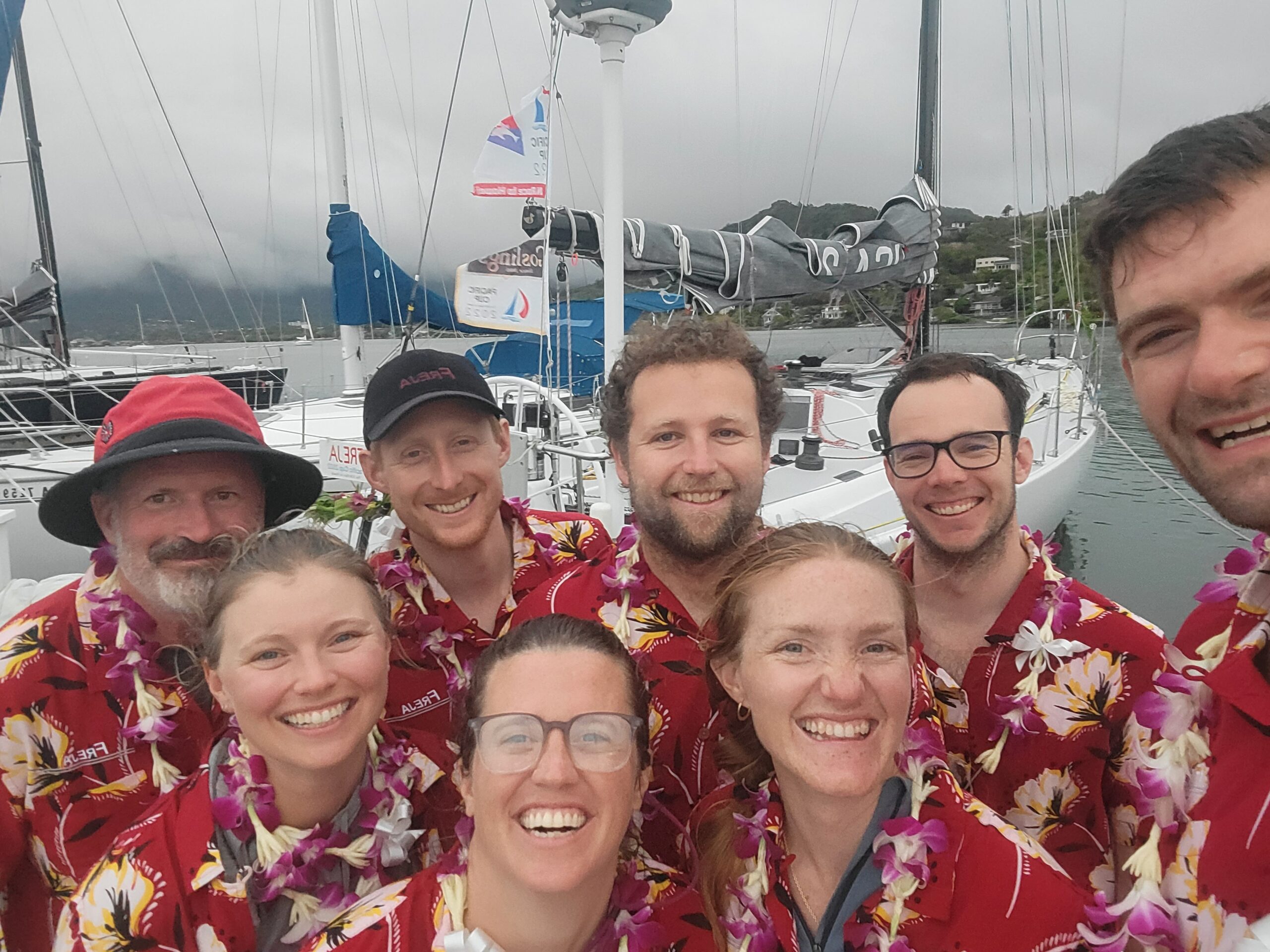 Our total elapsed time for the race was 10 days, 16:14:34, and we took fourth in our division and 15th overall. Not bad for a bunch of amateurs!
Our total elapsed time for the race was 10 days, 16:14:34, and we took fourth in our division and 15th overall. Not bad for a bunch of amateurs!
Takeaways from sailing across an ocean:
-
Do it with your friends; it’s the best!
-
Crocs were the ultimate, yes, ultimate, below-deck shoe. They are perfectly grippy and basically anyone can wear them, regardless of shoe size. Perfect.
-
Everyone likes Oreos.
-
Non-consensual surfing is terrifying.
-
Yogurt vacuum seals and freezes very well.
Molly Howe
Molly Howe moved to Seattle after graduating from Maine Maritime Academy in 2015. After working on tugboats for six years, she shifted gears to selling boats at Swiftsure Yachts. Molly lives aboard a Farr 50 with her husband, Jake. They are regulars at Monday night beer can races and enjoy sailing a wide variety of boats throughout the year.

